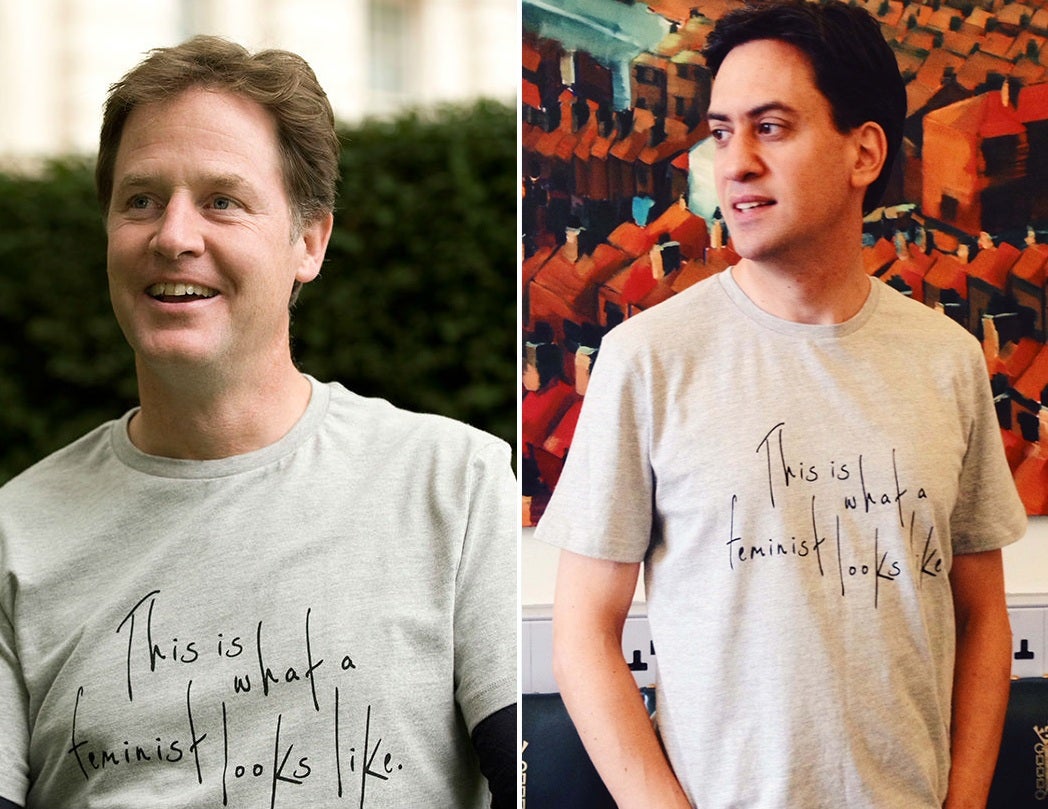Feminism charity Fawcett Society investigates claims T-shirts are made in sweatshop by women on 'just 62p an hour'
The T-shirts were worn by Ed Miliband, Nick Clegg and Harriet Harman

A pro-feminism charity is investigating claims that their T-shirt is made with sweatshop labour after leading politicians have been pictured wearing them.
Equality campaign group the Fawcett Society said it was "disappointed" to learn that their £45 top with the slogan "this is what a feminist looks like" is made by female machinists in Mauritius who are reportedly paid 62p an hour and sleep 16 to a room.
The charity claims that they thought the grey cotton T-shirt with a black slogan - worn by politicians Nick Clegg, Harriet Harman and Ed Miliband - would be made ethically but has since been pulled from their online shop.
The Mail on Sunday journalists toured one of the seven factories on the Indian Ocean island and reported that workers at Compagnie Mauricienne de Textile - which has a £125 million annual turnover - earned just 6,000 rupees (£120) a month.
The paper claimed that the wages paid by CMT for a minimum of 45 hours work per week, with employees often working 12-hour days, were a quarter of the country's average wage and half of what a waiter would earn. The women would have to work 72 hours with no spending or expenses to buy the £45 T-shirt, which costs £9 to make.
Fayzal Ally Beegun, president of the International Textile, Garment and Leather Workers Union, told the paper: "The workers in this factory are treated very poorly and the fact that politicians in England are making a statement using these sweatshop t-shirts is appalling."
The T-shirt was in collaboration with ELLE magazine, which has described it as part of an "ethically-produced" range, with high-street brand Whistles designing and producing it.
Dr Eva Neitzert, deputy CEO of the Fawcett Society, said they had been "assured that the garments would be produced ethically here in the UK", but claimed to have queried the ethical credentials of the factory and the materials used after they received samples of the T-shirts in early October.
There are around 2,800 female machinists out of 13,000 staff, with 4,500 foreign workers from Bangladesh, Sri Lanka, India and Vietnam housed on-site to make clothes for Urban Outfitters, Next and Topshop.
A spokesman for Whistles told the Mail: "We place a high priority on environmental, social and ethical issues. The allegations regarding the production of t-shirts in the CMT factory in Mauritius are extremely serious and we are investigating them as a matter of urgency."
The Fawcett Society statement continued: "We have been very disappointed to hear the allegations that conditions in the Mauritius factory may not adhere to the ethical standards that we, as the Fawcett Society, would require of any product that bears our name.
"At this stage, we require evidence to back up the claims being made by a journalist at the Mail on Sunday.
"However, as a charity that campaigns on issues of women's economic equality, we take these allegations extremely seriously and will do our utmost to investigate them."
A corporate responsibility statement on the CMT website states: "Our CSR policy sets the framework and guidelines for CMT’s pledge to humanely treating its employees, providing them with adequate compensation and protecting their rights.
"A safe and healthy workplace together with the welfare of the workers is believed to contribute to better products and services."
Join our commenting forum
Join thought-provoking conversations, follow other Independent readers and see their replies
Comments